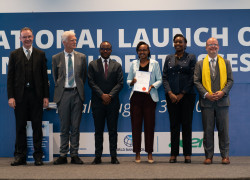PwC - 70% of institutional investors turning down projects on environmental, social and governance grounds
Seven out of ten institutional investors interviewed by PwC say they would decline to take part in a private equity fund raising or would turn down a co-investment on environmental, social and governance risk grounds.
Since the financial crisis, investors are under ever greater scrutiny regarding their wider environmental and social impact and purpose. The expectations of regulators, policymakers, NGOs and the general public for investors and their advisers to behave responsibly and deliver more than simply financial return are much higher than before, and are here to stay. “There is no doubt in these investors’ minds that identifying opportunities to implement improvements in managing the risks associated with environmental, social and governance issues will protect and increase the value of investments
Vincent Lebrun, Partner and Private Equity Leader at PwC Luxembourg
Bridging the Gap – PwC’s analysis of investor attitudes to responsible investment in the private equity industry - explores Limited Partners (LPs) and their attitudes to Environmental, Social and Governance (ESG) investment issues.
97% expect responsible investment to increase in importance over the next two years, with fiduciary duty, reputational risk and corporate values ranked as the top three reasons for responsible investment.
While there was broad agreement from investors that ESG creates value, both for society and shareholders, respondents say it is difficult to quantifying reputational value or risk reduction and to incorporate it into investment criteria.
Key findings include:
- 88% believe responsible investment adds financial value in private equity
- 83% of LP respondents believe that better management of ESG factors is their fiduciary duty
- 97% of LPs carry out an ESG assessment of a General Partner’s (GP, or private equity house) approach to RI before allocating funds
- 71% said their fund allocation was now linked to achieving ESG conditions
- 83% have responsible investment policies in place applying to their private equity investments
- Adoption of the ESG Disclosure Framework – the international standard for the industry - is mixed. 31% said they use it regularly, 14% occasionally, 47% never. LPs don’t know what information to ask for, and are concerned at the cost implications for “onerous” reporting – with some confessing they would struggle to analyse large volumes of ESG information even if they knew what to ask for and got it
- Despite the profile of the investment concerns over the past year, LPs revealed limited formal ESG reporting, with a focus on qualitative rather than quantitative data
- Respondents reported concern about their capacity to identify, examine and respond to ESG reporting
- The difficulties and high costs of exiting a fund once capital is committed means withdrawing or withholding capital is rare (18%) if adverse ESG info comes to light
The survey reflects the recent turbulent debates and action targeting institutional investors, particularly the pension funds of large public sector, education and religious organisations. Campaigners have called for the withdrawal or scaling back of investments from fossil fuel related activities and other sector-based investments with potentially negative environmental impacts.
Vincent Lebrun, Partner and Private Equity Leader at PwC Luxembourg, said:
“Since the financial crisis, investors are under ever greater scrutiny regarding their wider environmental and social impact and purpose. The expectations of regulators, policymakers, NGOs and the general public for investors and their advisers to behave responsibly and deliver more than simply financial return are much higher than before, and are here to stay. “There is no doubt in these investors’ minds that identifying opportunities to implement improvements in managing the risks associated with environmental, social and governance issues will protect and increase the value of investments.”
Laurent Rouach, Partner and Sustainability Leader at PwC Luxembourg concluded:
“The frameworks exist for effective ESG assessment, monitoring and reporting, which would enable LPs to use their investment power to drive sustainable, long-term change in response to stakeholders’ concerns. We need to see more active integration and interrogation of ESG matters in private equity investment. It could shift the power of institutional funding from being a threat of withdrawal to a force to embed an orderly, sustainable transition to a low-carbon economy, not only setting the timeline for change, but securing vital funding for it too.”
To download an electronic copy of Bridging the Gap, visit http://www.pwc.lu/en/sustainability/docs/pwc-sustainability-bridging-the-gap.pdf
Communiqués liés
RSA launches technology and management liability insurance s...
RSA Luxembourg, part of Intact Insurance Specialty Solutions, today announces th...
Lancement d'une nouvelle connexion intermodale entre Bettemb...
CFL multimodal a le plaisir d'annoncer le lancement de sa nouvelle connexion i...
Experts from LUNEX award first micro-credentials in Rwanda o...
The Rwanda Ministry of Education (MINEDUC) formally inaugurated Syllabi, a publi...
ERG Notes that ENRC Secures Landmark Victory as Court of App...
Eurasian Resources Group (ERG), a leading diversified natural resources group he...
LetzToken et La Vie est Belle annoncent leur partenariat ouv...
«?LetzToken?», plateforme de tokenisation pionnière basée à Luxembourg, et ...
ERG announces a Pre-Export Finance Facility Agreement based ...
Eurasian Resources Group (“ERG”, “The Group”), a leading diversified nat...
Il n'y a aucun résultat pour votre recherche









